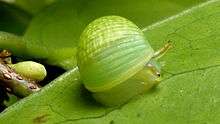Simpulopsis rufovirens
| Simpulopsis rufovirens | |
|---|---|
 | |
| Dorsal view of a live individual of Simpulopsis rufovirens | |
| Not listed in IUCN Red List[1] | |
| Scientific classification | |
| Kingdom: | Animalia |
| Phylum: | Mollusca |
| Class: | Gastropoda |
| (unranked): | clade Heterobranchia clade Euthyneura |
| Superfamily: | Orthalicoidea |
| Family: | Simpulopsidae |
| Genus: | Simpulopsis |
| Subgenus: | Simpulopsis |
| Species: | S. rufovirens |
| Binomial name | |
| Simpulopsis rufovirens (Moricand, 1846)[2] | |
| Synonyms[3][4][5] | |
| |
Simpulopsis rufovirens is a species of tropical air-breathing land snail, terrestrial pulmonate gastropod mollusk in the family Simpulopsidae.
The specific name rufovirens refers to the coloration of this species. The name is composed from the Latin word "rufus", which means red or reddish, and from Latin word "virens", which means green.
Distribution
The distribution of Simpulopsis rufovirens includes Brazil.[3]
Description
The shell is semi-globose and very thin.[4] The color of the shell is olive-green or brown-tinted olive in color; somewhat shining but not glossy.[4] The surface is closely and strongly corrugated.[4] The corrugation rather is regular, though sometimes folds split or are intercalated.[4] Spire is conic.[4] The shell has 3½-4 moderately convex whorls.[4] The last whorl is globose.[4] The suture is slowly descending in front.[4] Aperture is rounded-ovate, very oblique, the outer lip thin, its upper end inserted at or near the periphery of the penultimate whorl.[4] The columellar lip is very thin and regularly arcuate.[4]
The width of the shell is 10.7[5]-14 mm;[4] the height of the shell is 11.7[5]-14 mm.[4] The width of the aperture is 9.5 mm; the longest axis of the aperture is 12.4 mm.[4]
 Frontal view of Simpulopsis rufovirens |
 Apical view of Simpulopsis rufovirens |

References
This article incorporates public domain text from the reference[4]
- ↑ IUCN (2012). IUCN Red List of Threatened Species. Version 2012.2. <www.iucnredlist.org>. Downloaded on 25 October 2012.
- ↑ Moricand S. (1846). Mem. Soc. Phys. et His. Nat. Géneve, 11: 147-149, plate 5, figure 4.
- 1 2 (in Portuguese) Salgado N. C. & Coelho A. C. S. (2003). "Moluscos terrestres do Brasil (Gastrópodes operculados ou não, exclusive Veronicellidae, Milacidae e Limacidae)". Rev. Biol. Trop. 51(Suppl. 3): 149-189. (with English abstract), PDF.
- 1 2 3 4 5 6 7 8 9 10 11 12 13 14 15 Pilsbry H. A. (1899). In: Tryon G. W. & Pilsbry H. A. (1899). Manual of Conchology. Second Series: Pulmonata. (2)12: 216-217, plate 64, figs. 88-91; page 226.
- 1 2 3 Breure A. S. H. (1978), "Notes and descriptions of Bulimulidae (Mollusca, Gastropoda)". Zoologische Verhandelingen 164: 1-255. page 232. PDF.
- ↑ (in German) Pfeiffer L. (1854). "Die Gattungen Daudebardia, Simpulopsis, Vitrina und Succinea". page 30, plate 3, figs. 3-4; plate 6, figures 17-19. In: Küster H. C. et al. (eds.). Systematisches Conchylien Cabinet von Martini und Chemnitz, J. H. Casselis, 1(part. 11): 1-59, pls. 1-6.
External links

Wikimedia Commons has media related to Simpulopsis rufovirens.